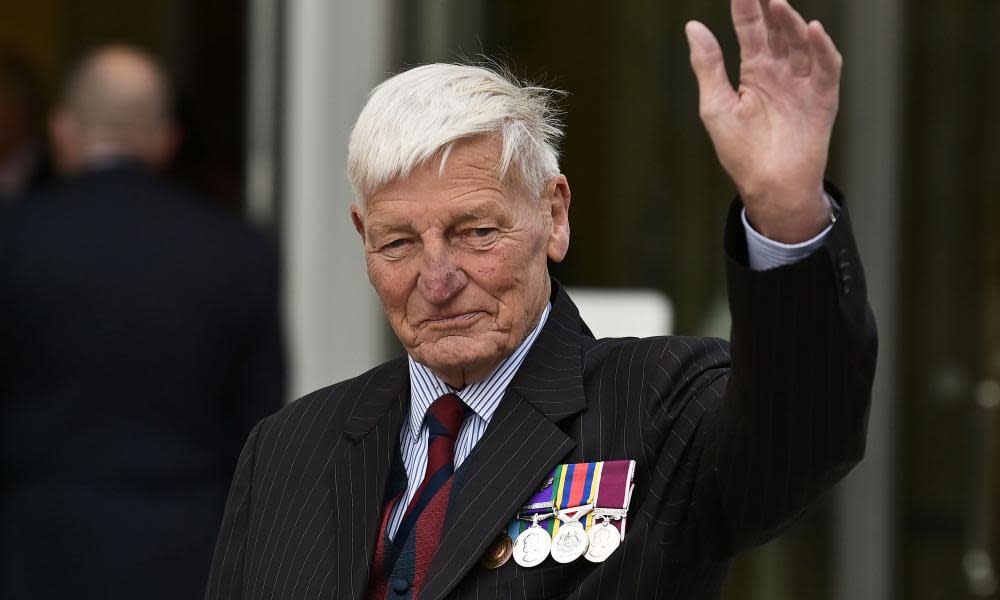Army veteran’s Troubles trial contributed to his death, lawyer says

The lawyer of a terminally ill 80-year-old army veteran who died of Covid-19 three days into a trial over a fatal shooting during the Troubles in Northern Ireland has said the proceedings contributed to his death.
Philip Barden, who acted for Dennis Hutchings, said he would be “alive today” had he not been compelled to go to Northern Ireland to stand trial over the killing of a 27-year-old man with learning difficulties in 1974.
The trial at Belfast crown court had been adjourned on Monday after it emerged Hutchings – who had kidney disease, was on dialysis and also suffered heart problems – had contracted the virus over the weekend.
After isolating in his hotel room he was taken to hospital and died on Monday night.
Barden, who was with him when he died, said: “Nobody cared, that’s what is so sad. Nobody cared about putting a man who is 80 years old on trial in these circumstances. They knew of his health conditions and that’s what is so wrong.”
John Pat Cunningham was shot in the back as he ran from an army patrol in a field near Benburb 47 years ago.
The Northern Ireland prosecution service said the decision to bring the soldier to trial was in the public interest.
The trial has reignited the controversy over the government’s plans to offer an amnesty for historical crimes involving veterans and some think the death of Hutchings may hasten its progress through parliament.
The deputy director of public prosecutions in Northern Ireland, Michael Agnew, said the decision to prosecute was “taken after an impartial and independent application of the test for prosecution”.
“Whilst a review of a previous no prosecution decision does not require the existence of new evidence, the police investigation in this case resulted in a file being submitted to the PPS, which included certain evidence not previously available,” Agnew added.
In a statement on behalf of the family of Cunningham, the Pat Finucane Centre, a human rights group, said they wanted “to acknowledge that this is a difficult time for [Hutchings’] family and that they should be given time to grieve”.
They said they would put out a more detailed response at a more appropriate time but it was “factually inaccurate to allege that this prosecution was politically motivated and part of a fictitious ‘witch-hunt’ against British soldiers. This claim by senior politicians impugns the professional integrity, independence and impartiality of those involved in the recent investigation and prosecution.”
They added that sections of the British press and within unionism that had commented that the victim was an Irish Catholic distracted from the reality of the case, which was that he was an innocent victim. “Shame on them,” said the statement.
The court had heard that Cunningham had “been born with an incomplete development of the mind” and was “said to have the mind of a seven-year-old”. He was known to be “anxious around men in uniforms, and was known to have run from army, police and priests”.
The Democratic Unionist party leader, Sir Jeffrey Donaldson, said “serious questions need to be raised” about the decision to prosecute, adding Hutchings had been “dragged to a court and hounded until his death”.
The Ulster Unionist party leader, Doug Beattie, called for an independent review of the prosecution, questioning whether the trial had hastened Hutchings’ death.
Earlier this year, Hutchings, from Cawsand, Torpoint in Cornwall, said he was planning a case alleging a breach of human rights.
“It’s too late for me [not to face trial] but it’s not too late for the government to do the right thing for all those veterans who served to maintain peace in Northern Ireland and who continue to live in fear of a knock on the door.
“But if the government won’t act or listen to the veterans and the British people, then I hope Strasbourg will,” Hutchings said at the time.
The Conservative MP Johnny Mercer, who has campaigned against prosecutions for legacy killings and had travelled to Belfast to support the former soldier, had called the trial a “grotesque experience” for Hutchings.

 Yahoo Movies
Yahoo Movies 
